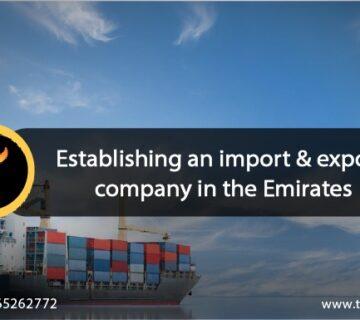Establishing a Company in Dubai
Dubai, with its thriving economy, strategic location, and investor-friendly policies, has emerged as a popular destination for entrepreneurs and businesses looking to expand or establish a presence in the Middle East. Setting up a company in Dubai offers numerous advantages, including access to a growing market, a robust infrastructure, and a favorable business environment. In this article, we will explore the process of establishing a company in Dubai and the key factors to consider.
Benefits of Establishing a Company in Dubai
Establishing a company in Dubai brings several benefits for entrepreneurs:
- Strategic Location: Dubai serves as a gateway to both the Middle East and North Africa, providing easy access to regional markets.
- Business-Friendly Policies: The government of Dubai has implemented investor-friendly policies, making it easier to set up and operate a company.
- Tax Advantages: Dubai offers tax incentives, including zero corporate and personal income tax, making it an attractive destination for businesses.
- Growing Economy: Dubai’s economy is diverse and rapidly expanding, providing ample opportunities for various industries.
- Infrastructure and Connectivity: Dubai boasts world-class infrastructure, including modern transportation systems, telecommunications, and state-of-the-art facilities.
Types of Companies in Dubai
There are several types of companies that can be established in Dubai, including:
- Free Zone Company: A company registered in a designated free zone, providing 100% foreign ownership and various tax benefits.
- Mainland Company: A company registered with the Department of Economic Development (DED), allowing access to the local market.
- Offshore Company: A company registered in a tax-free jurisdiction, primarily used for international business and asset protection.
Legal Requirements for Company Formation
To establish a company in Dubai, certain legal requirements must be fulfilled, such as:
- Trade Name Reservation: Select a unique trade name for the company and obtain approval from the relevant authorities.
- Memorandum of Association: Prepare the memorandum of association, which outlines the company’s activities, ownership structure, and capital.
- Shareholders and Directors: Identify shareholders and directors, including their roles and responsibilities within the company.
- Local Sponsorship: In the case of a mainland company, appoint a local sponsor who holds 51% ownership in the company.
- Commercial License: Obtain the necessary commercial license from the relevant authorities based on the nature of the business.
Steps to Establish a Company in Dubai
The process of establishing a company in Dubai typically involves the following steps:
- Conduct Market Research: Understand the local market, target audience, and competition to develop a viable business plan.
- Choose a Business Activity: Determine the specific business activity and industry sector for your company.
- Select a Business Name: Choose a unique and meaningful name for your company, adhering to the guidelines set by the authorities.
- Determine the Legal Structure: Decide on the appropriate legal structure for your company, considering factors such as liability, ownership, and operational requirements.
- Obtain Approvals and Licenses: Complete the necessary paperwork and obtain approvals and licenses from the relevant government authorities.
- Secure Office Space: Find suitable office space that meets your business requirements and is compliant with local regulations.
- Hire Employees: Recruit and hire employees based on the needs of your business, adhering to labor laws and regulations.
- Open a Bank Account: Establish a corporate bank account in Dubai to facilitate financial transactions and operations.
- Register with Authorities: Register your company with the relevant government departments, such as the DED or free zone authority.
Choosing the Right Business Structure
When establishing a company in Dubai, it is essential to choose the right business structure that aligns with your goals and objectives. The available options include sole proprietorship, partnership, limited liability company (LLC), and others. Each structure has its own advantages and considerations in terms of ownership, liability, and taxation.
Obtaining Trade Licenses
Obtaining the necessary trade licenses is a crucial step in establishing a company in Dubai. The type of license required depends on the nature of the business activity, such as commercial, professional, industrial, or tourism-related. The licenses are issued by the DED or the respective free zone authority.
Finding a Local Sponsor
For mainland companies, a local sponsor or Emirati partner is required. The local sponsor holds 51% ownership in the company, while the foreign investor retains 49% ownership. The sponsor’s role is primarily legal, and they are not involved in the day-to-day operations of the business.
Opening a Bank Account
Opening a corporate bank account is necessary for conducting business operations, managing finances, and facilitating transactions. Choose a reputable bank in Dubai that offers the services and features suitable for your business needs.
Finding Office Space
Finding suitable office space is crucial for establishing a physical presence in Dubai. Consider factors such as location, size, amenities, and lease terms. You can choose to set up your office in a free zone or the mainland, depending on your business requirements.
Hiring Employees
As your business grows, you may need to hire employees. Ensure compliance with labor laws, obtain necessary work permits, and provide a conducive work environment for your employees. Dubai has a diverse talent pool with individuals from various backgrounds and nationalities.
Taxation and Financial Considerations
Dubai offers a favorable tax environment for businesses. There is no corporate or personal income tax levied on most businesses. However, it is essential to understand the local tax regulations and maintain proper financial records to ensure compliance.
Business Etiquette and Cultural Factors
Understanding the local business culture and etiquette is crucial when establishing a company in Dubai. Respect for Islamic customs, local traditions, and building strong relationships with business partners are highly valued. It is advisable to work with local professionals or consultants who can provide guidance on cultural norms and business practices.
Sector-specific Regulations
Certain industries in Dubai may have additional regulations and licensing requirements. For example, industries such as healthcare, education, finance, and media have specific regulatory bodies that oversee compliance and licensing. Ensure that you are aware of any sector-specific regulations applicable to your business.
Conclusion
Establishing a company in Dubai can be a rewarding endeavor, offering access to a thriving market, strategic location, and favorable business environment. By following the necessary legal procedures, understanding the market dynamics, and adhering to local regulations, you can set the foundation for a successful business venture in Dubai.
FAQs
Q1: Can foreign investors fully own a company in Dubai?
A1: Yes, foreign investors can fully own a company in designated free zones in Dubai. However, for mainland companies, a local sponsor is required who holds a 51% ownership stake.
Q2: Are there any tax benefits for companies in Dubai?
A2: Dubai offers tax advantages, including zero corporate and personal income tax for most businesses. However, it is essential to comply with tax regulations and maintain proper financial records.
Q3: Can I choose any business name for my company in Dubai?
A3: Business names in Dubai should adhere to certain guidelines and should not violate any trademarks or copyrights. It is advisable to choose a unique and meaningful name for your company.
Q4: Are there restrictions on hiring foreign employees in Dubai?
A4: Dubai has a diverse workforce, and hiring foreign employees is common. However, there are specific visa and work permit requirements that need to be fulfilled for employing foreign nationals.
Q5: What are the advantages of setting up a company in a free zone in Dubai?
A5: Free zones in Dubai offer 100% foreign ownership, tax exemptions, and simplified business setup processes. They are ideal for companies involved in international trade and specific industries.
Please note that the information provided in this article is for general guidance purposes only, and it is advisable to seek professional advice and consult with relevant authorities for specific requirements and regulations pertaining to your business.
Follow us on social media






